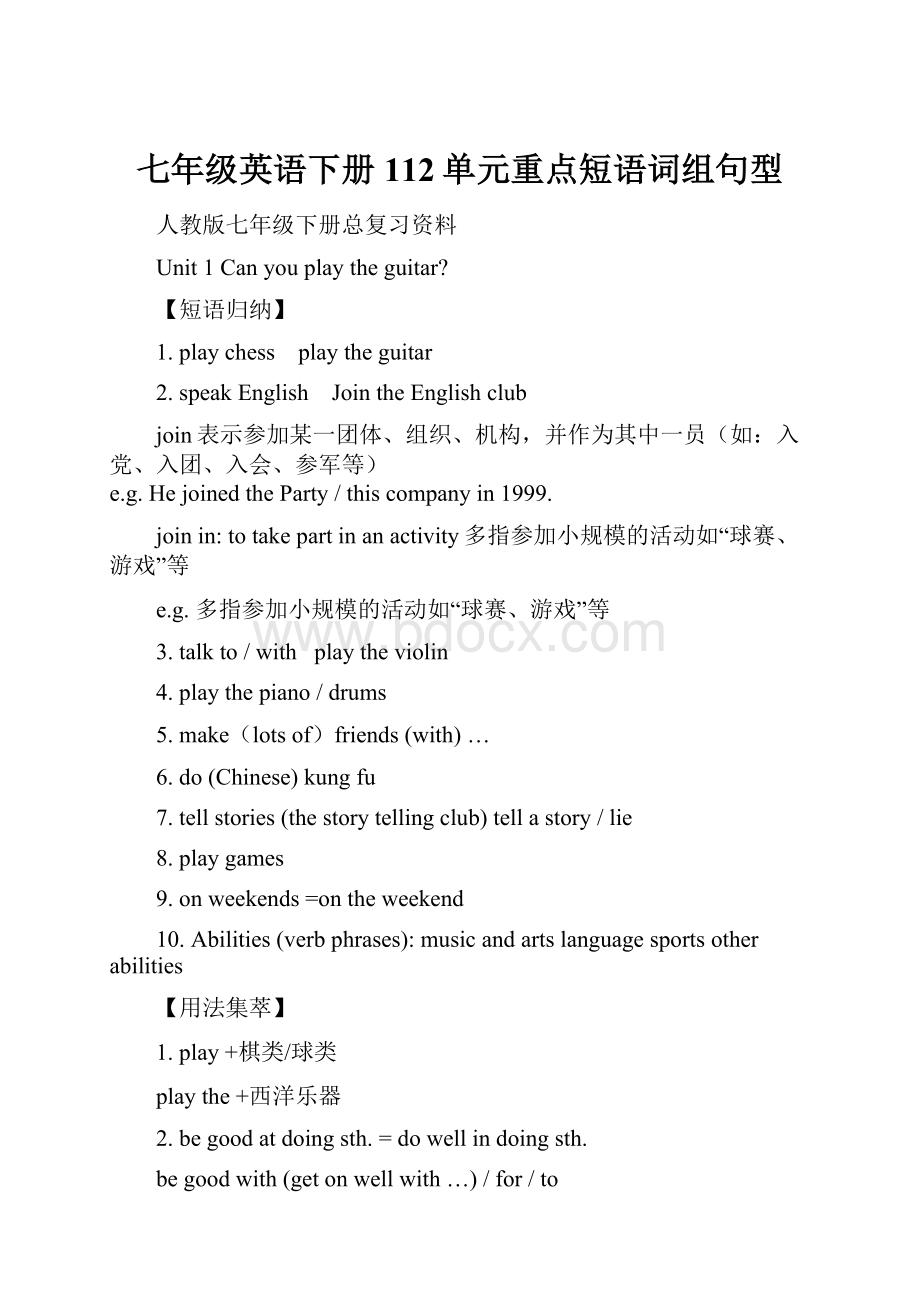七年级英语下册112单元重点短语词组句型.docx
《七年级英语下册112单元重点短语词组句型.docx》由会员分享,可在线阅读,更多相关《七年级英语下册112单元重点短语词组句型.docx(30页珍藏版)》请在冰豆网上搜索。

七年级英语下册112单元重点短语词组句型
人教版七年级下册总复习资料
Unit1Canyouplaytheguitar?
【短语归纳】
1.playchessplaytheguitar
2.speakEnglishJointheEnglishclub
join表示参加某一团体、组织、机构,并作为其中一员(如:
入党、入团、入会、参军等)
e.g.HejoinedtheParty/thiscompanyin1999.
joinin:
totakepartinanactivity多指参加小规模的活动如“球赛、游戏”等
e.g.多指参加小规模的活动如“球赛、游戏”等
3.talkto/withplaytheviolin
4.playthepiano/drums
5.make(lotsof)friends(with)…
6.do(Chinese)kungfu
7.tellstories(thestorytellingclub)tellastory/lie
8.playgames
9.onweekends=ontheweekend
10.Abilities(verbphrases):
musicandartslanguagesportsotherabilities
【用法集萃】
1.play+棋类/球类
playthe+西洋乐器
2.begoodatdoingsth.=dowellindoingsth.
begoodwith(getonwellwith…)/for/to
3.need/want/teach/ask/help/tellsb.todosth.
Ittakessometimetodosth.
4.can+动词原形
6.alittle+不可数名词一点儿……
7.jointhe…club
8.liketodosth.=lovetodosth./likedoingsth.
9.Heoftensays“hi”tomewithasmile.
Mybrothertellsmenottositbythepool./Mybrothertellsmethetruth.
JimisspeakingtoTom./HecanspeakalittleChinese.
Mysisteristalkingwithhim.
【句型归纳】
1.Whatclubdoeshewanttojoin?
Hewantstojointhechessclub.
2.Itisveryinterestingandfuntojointheschoolartclub.
3.IcanspeakEnglishandIcanalsoplaysoccer.
Mysisterdoesn’tlikethissong,either.
4.PleasecallMrs.Liat555-3721formoreinformation.
5.CanIswimhere?
Yes,youcan./Sorry,childrenmustn’tswimalonehere.
6.Canhedanceorsing?
Hecansing.
7.Let’sjoin,shallwe?
/Letusjoin,willyou?
8.TeachersWantedforHopeSchool(作文)
StudentsWantedforSchoolShow
9.Comeandshowus!
(show/give/teachsth.tosb./showsb.sth.)
10.Whataboutgoingtothemovie?
11.ShemakesmereadEnglisheveryday.
12.Doyouneedsomehelpattheoldpeople’shome?
Yes,please.
13.Mr.LiteachesusEnglishthisterm.
14.Wewanttwogoodmusiciansforourrockband.
15.MayIknowyourname?
=What’syourname?
16.Canyouhelpkidswithswimming?
17.Areyougoodwithkids?
Unit2Whattimedoyougotoschool
【短语归纳】
1.belatefor2.gotoschool /bed3.getup
4.takeashower/walk5.brushtooth 6.getto (家,我家,学校)7.do(one’s)homework
8.gotowork 去上班9.gohome 10.eatbreakfast 11.getdressed
12.radiostation 13.either...or.../both…and…/each/every/all
15.inthemorning/afternoon/evening 16.lotsof/quitealot
Alotof/some/any/plentyof
Muchlittlealargeamountofagreatdealof
Manyfewanumberof
【语法归纳】
1.whattime与when
用when提问,回答既可以是具体的时间,也可以是不具体的时间,如:
inthemorning,lastyear,in1998等范围大的时间。
向对方询问具体时间时,即几点几分,只能用whattime,不能用when。
询问年份、月份、日期时,只能用when,不能用whattime。
2.英语时间的表达
(1)整点时间可表示为“钟点数+o’clock”或直接读钟点数,省去o’clock。
如:
It’steno’clocka.m. 现在是上午十点整。
(2)非整点时间可直接采取读数法。
如:
It’seight-thirty.是八点三十分。
注意时间的表达方式:
用数词。
点与分钟之间用连字如:
顺读法:
钟点数+分钟数。
4:
25→fourtwenty-five,6:
58→sixfifty-eight,7:
00→seveno’clock
逆读法:
分钟为+介词to/past+钟点数,
可分两种情况:
1)分钟为不超过半小时,用分钟数+past+钟点数。
4:
23→twenty-threepastfour,5:
19→nineteenpastfive.
2)分钟数超过了半小时,用(所差的)分钟的+to+(下一个)钟点为
10:
58→twotoeleven7:
31→twenty-ninetoeight
在逆读法中分钟数逢“五”逢“十”可省略minute(s)。
否则应加上。
当然,英语习惯上把十五分钟(fifteen)称作一刻aquarter,三十分钟(thirty)称为half/half,因此10:
30,
可以用两种表达方式,halfpastten,tenthirty。
3.on,at,in这三个常用介词都可以表示时间和地点,但具体用法不同.
①on用在日期、星期几、节日前,也表示在具体某一天及具体某一天的上午、下午和晚上。
onNovember1st onMonday onChildren’sDay onTuesdayevening
②in用于月份、季节、年份前,当early,late用于句首修饰介词短语时,尽管表示具体某一天的上午、下午、晚上,都要用in,泛指一般的上、下午,晚上也用in。
EarlyinthemorningofNationalDay,Igotuptocatchthefirstbustothezoo.
③将来时态表“过一段时间后”及“在...期间”和“在某个季节,某年、某月”都用in。
XiaoMingwasborninDecemberof2004.
4、Heworksataradiostation.
work:
人们日常工作和生活中从事的体力和脑力劳动,各类工作。
不可数名词
job:
指具体的职业或工作。
可数名词
5.takeawalk
takeawalk=haveawork=goforawalk 散步
6.either...or... “要么…要么…”,连接句子中两个并列的成分,表示两者之一。
当连接两个主语时,谓语动词应该与最近的一个主语在人称和数上保持一致,即就近原则。
7.Peoplelovetolistentohim.
lovetodosth.=liketodosth.verymuch.喜欢做某事,强调具体活动。
2
而lovedoingsth.=likedoingsth.verymuch则强调习惯。
Doyoucomeouttoplaywithme?
你喜欢出来和我玩吗?
Ilike watchingTV.我喜欢看电视。
8.hear与listentohear意为“听见”,表示听的结果,而listento则表示“听”,强调的是“听”的动作。
Let’slistentothemusic.Welistenbutdon’thear.
9.Hegetshomeat7:
00,andhewatchesmorningnewsonTV.
句中get意为“到达”,后接地点名词时,要加介词to,后接副词时,不能加to.
Shegetstoschoolatsixo’clock.
注:
home是一个副词,所以其前不能加介词to,但home也可作名词,这时其前有物主代词时,可以加to,Shegetstoherhomeateighto’clock.
apieceofnews一条新闻,twopiecesofnews 两条新闻。
watch……onTV表示通过电视看……节目WeoftenwatchfootballgameonTV.
10.What’sthetimenow?
It’s8:
20.
What day isit today?
It’sMonday.
What’sthe date today?
/ What date isit today?
It’s Oct 6th.
Whattimedoeshegotoschool?
11.Whatafunnytimetoeatbreakfast!
(1)Whata/an+形容词+单数名词+主语+谓语!
whatagoodgirlsheis!
(2)What+形容词+可数名词复数+主语+谓语!
Whatgoodgirlstheyare!
(3)What+形容词+不可为名词+主语+谓语!
Whatterribleweatheritis!
13.always>usually>often>sometimes>seldom>hardly>never
【典句必背】
1.Whattimedoyoutakeashoweronschooldays?
Itakeashowerat8:
00.
2.Whattimedoesyourbestfriendexerciseonweekends?
Heusuallyexercisesatabouttentwenty.
3.Idon’thavemuchtimeforbreakfast,soIusuallyeatveryquickly.
4.WhenIgethome,IeitherwatchTVorplaycomputergames.
5.Sheknowsitisnotgoodforher,butittastesgood.
6.Wecan’thaveunhealthyhabitsandthenwecanhaveaveryhealthylife.
7.Sheisneverlateforthefirstclassinthemorning.
Unit3Howdoyougettoschool?
【短语归纳】
到达学校乘地铁骑自行车乘公共汽车多远每天从……到……公共汽车站
认为和……玩在……和……之间一个11岁的男孩实现不得不步行去
多长时间上一封电子邮件骑自行车去上学校从你家到学校我不确定这是很好的锻炼
有一个美好的一天步行去上学开他的车去上班乘公共汽车去上学公共汽车站
汽车站火车站到他祖父母家地铁站认为过河做某事很容易
在……和……之间乘/坐索道害怕某事/某物害怕做某事与……玩……
许多学生离开村庄离开我家因为…而感谢花某人的时间做某事
1.gettoschool2.takethe/asubway3.ridethe/abike/bybike4.howfar
5.from…to…6.everyday7.takethe/abus8.busstop
10.thinkof11.between…and…12an11-year-oldboy13.playwith…
14.cometrue15.haveto16.walkto17.howlong
18.laste-mail19.rideabiketoschool=gotoschoolbybike
20.fromyourhometoschool21.I’mnotsure22.It’sgoodexercise23.haveagoodday
24.walktoschool=gotoschoolonfoot25.drivehiscartowork=gotoworkbycar
26.gotoschoolbybus=takeabustoschool27.busstop28.busstation
29.trainstation30.subwaystation31.gettohisgrandparents’home
32.thinkof=thinkabout33.crosstheriver34.it’seasytodosth.
35.between...and...36.goonaropeway37.beafraidofsth38.beafraidtodosth.
39.playwithsb.40.manyofthestudents=manystudents
41.leavethevillage42.leavemyhome43.thinksforsth=thinksfordoingsth.
44.takessbtimetodosth
【用法集萃】
1、乘…去…take…to…=goto…by…
eg:
takeabustoschool=gotoschoolbybus
乘公共汽车去上学
2、Howdo/does…getto…?
…是怎样到……的?
eg:
Howdoyougettoschool?
你怎样去上学?
3、Howfarisitfrom…to…?
从…到…有多远?
eg:
Howfarisitfromyourhometoschool?
从你家到学校有多远?
4、Ittakessb.sometimetodosth.做某事花费某人多长时间。
eg:
Ittookmehalfanhourtogotoschoolbybikeyesterday.昨天我骑自行车去学校花了半个小时。
5、Howlongdoesittake…?
……花费多长时间?
eg:
Howlongdoesittakeyoutogettoschool?
你到学校要花多少时间?
6、做某事是……Itis+adj.+todosth.
eg:
Formanystudents,itiseasytogettoschool.
对许多学生来说,到校是很容易的。
7、在……和……之间between…and…
eg:
Thereisaverybigriverbetweentheirschoolandthevellage.在他们的学校和村庄之间有一条大河。
8、感谢你(做)某事。
Thanksfor+n../v.–ing.
Thanksforyourlaste-mail.谢谢你上次的电子邮件。
3.
9、离开某地leave+地点名词Heleaveschoolatsixeveryafternoon.他每天下午6点钟离开学校。
10、离开A地去B地leave+地点名词A+for+地点名词BMyunclewillleaveChinafortheUSA.
我叔叔要离开中国去美国了。
11、动身去……leavefor…MyunclewillleavefortheUSA.我叔叔要动身去美国了。
12、认为…怎么样what…thinkof=what…thinkaboutMarywantstoknowwhathethinksofthetrip.
玛丽想知道他认为这次旅行怎么样。
【典句必背】
1.你是怎样到学校的?
我骑自行车。
2.她怎样去学校的?
她通常乘公共汽车。
3.你到学校要花多长时间?
大约要花15分钟。
4.从你家到学校有多远?
只有约2公里。
5.简是步行去上学吗?
不,她不是。
她骑车。
6.他们是乘公共汽车上学的吗?
不,他们不是是。
他们步行。
7.在他们的学校和村庄之间有一条很大的河。
8.对许多学生来说,上学是件容易的事情。
9.他对我来说就像父亲一样。
10.有一座桥是他们的梦想。
11.他们的梦想能实现吗?
12.他们不得不穿越一条在他们学校和村庄之间的大河。
1、Howdoyougettoschool?
Iridemybike.
2、Howdoesshegettoschool?
Sheusuallytakesthebus.
3、—Howlongdoesittakeyoutogettoschool?
Ittakesabout15minutes.
4、Howfarisitfromyourhometoschool?
It’sonlyabouttwokilometers.
5、DoesJanewalktoschool?
No,shedoesn’t.Shegoesbybike.
6、Dotheytakethebustoschool?
No,theydon’t.Theywalk.
7、Thereisaverybigriverbetweentheirschoolandthevillage.
8、Formanystudents,itiseasytogettoschool.
9.He’slikeafathertome.
10.Itistheirdreamtohaveabridge.
11Cantheirdreamscometrue?
12Theyhavetocrossaverybigriverbetweentheirschoolandthevillage.
【语法专项】询问交通方式
1、How+do/doessb.+谓语动词+地点?
询问某人以什么方式到达某地。
eg:
HowdoesyourunclegotoBeijing?
你叔叔怎样去北京?
2、Do/Doessb.+交通方式+地点?
某人是不是以某种方式来/去某地的。
eg:
Doesyourdadhiscartowork?
你爸爸开他的车去上班吗?
表达交通方式用介词表示
(1)介词by+表示交通工具的名词单数形式,(名词前不加冠词,和修饰语)
eg:
Weoftengotoschoolbybike.我们常常骑自行车去上学。
(2)介词on/in修饰语+交通工具的的名词(修饰语可以是冠词、形容词性物主代词或名词所有格)
eg:
—Howdidhegotoschoolyesterday?
—Onhisbike.
DoesJimgotovisithisgrandparentsinhiscar?
吉姆开车去看他的祖父母了吗?
※a:
on+bike/motorbike
eg:
Theygotoworkontheirbikes/motorbikes.
他们骑自行车/摩托车上班。
b:
in+car/taxi
WearegoingtothesupermarketinJohn’scar.我们将坐约翰的车去超市。
c:
on+表示交通工具的动物名词,表示“骑驴/马/象/骆驼等”。
其中要在动物名词前加不定冠词a/an。
eg:
Hewentthereonahorse.他骑马去了那里。
3、用动词表示
(1)动词+to地点或+地点副词(ride/drive/